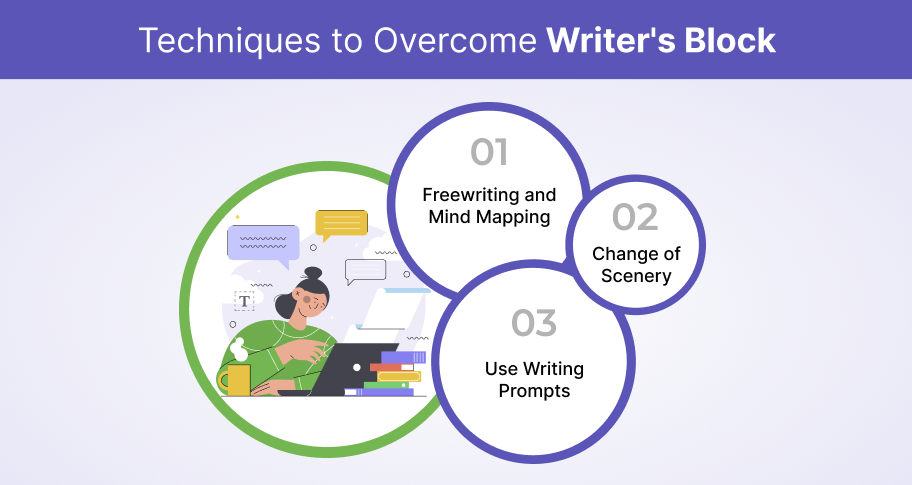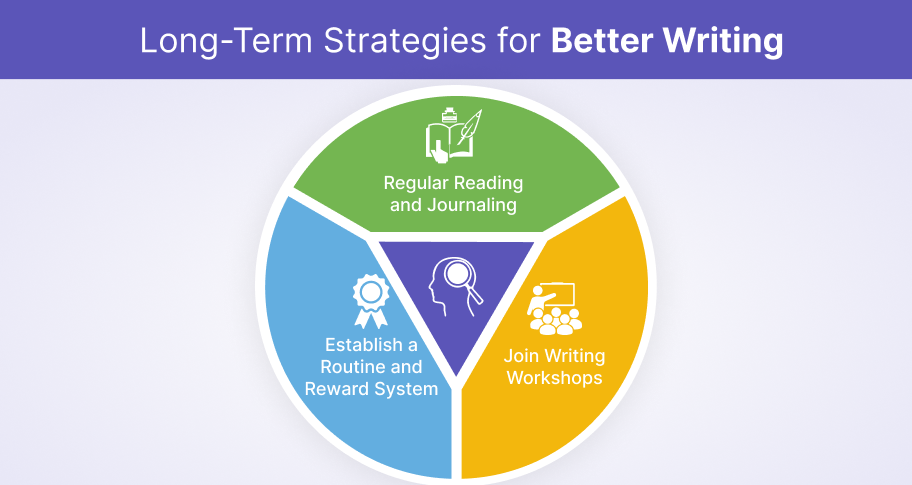June 13, 2024
Introduction
It’s 12:59 a.m. and you’re staring at a blank page. The same blank page you’ve been staring at for three days now. Nothing comes to mind—other than the screaming voice in your head reminding you that you have a paper due in less than 24 hours. Panic takes hold as your eyes sear and you punch keys, praying it will all make sense. Two sentences later…you delete everything in despair.
With red eyes and hands in hair you glare at your screen. The cursor blinks back at you, as if oblivious to your plight.
The hours tick by…
Been there, done that?
Yeah, everyone has. It’s called writer’s block. The inability to break through, to get going, to know how to proceed all the way to the end. And it can be frustrating as heck.
Writer’s block is a psychological condition all too familiar to many high school and college students.
It can strike anyone. It manifests as a paralyzing inability to write, whether it’s starting a new piece, continuing an existing one, or finishing an essay that is past due. This mental block can cause you to miss deadlines, adding poor grades to your worries. It is the bane of everyone who ever had to sit at a computer screen and produce content on demand.
The purpose of this article is to share some tips on how to overcome this curse called writer’s block. With some simple yet effective tricks, this article will give you just the right skills to tackle writer’s block head-on and regain your writing mojo.
Understanding Writer’s Block
Definition
Writer’s block is a condition where a person who is trying to write something cannot forge ahead with a new thought. Every start feels like a false one. Words seem impossible to fit together. Complete sentences escape the grasp. The purpose of paragraphs is lost.
What’s more, writer’s block can strike at any time. It can occur at any stage of the writing process, from initial brainstorming attempts to the drafting stage and even in the revising and finalizing stages. It is like a fog descends and covers the mind, numbing it and putting it to sleep. It is characterized by a persistent inability to write, despite a clear intention or need to do so.
Causes
Several factors can contribute to writer’s block. Common causes include:
- Stress: High levels of stress can shut down the cognitive function, so that it is impossible to focus and write out a coherent string of thoughts.
- Perfectionism: The desire to produce perfect work can cause one to overthink the act of writing. Too much self-censorship occurs, which stalls the writing process.
- Lack of Ideas: Sometimes, the mind simply goes blank, and no matter how hard one tries, nothing good comes up. Call it a lack of inspiration, lack of motivation, lack of direction, or lack of focus—the point is the mind is void and full of an echoing, “HELLO… Hello… hello… hello…?”
- Fear of Failure: Some people can’t get going simply because they are afraid their writing will not be good enough. They don’t want to fail, and that fear prevents them from ever starting.

Impact on Students
Writer’s block is especially bad for high school and college students. These students are often juggling multiple tasks, trying to balance work, home, and school life at once. They may be drained on any front—and when that happens, they struggle with the others. Students who are already depleted will ultimately face writer’s block the same way fresh hot asphalt faces a steamroller.
If the student is unable to overcome this mental void, writer’s block can hurt the student on three levels:
- Academic Performance: Missed deadlines and subpar essay writing will mean poor grades, which in turn can affect a student’s overall academic standing and prevent the student from achieving academic goals—such as a passing grade, graduation, or a scholarship.
- Mental Health: The stress and frustration that comes with writer’s block can give a student anxiety, sleeplessness, depression, and other mental health issues.
- Self-Esteem: Repeated failures to write can seriously undermine a student’s self-confidence. The longer it goes on, the worse the student will think of himself.
Sounds scary, right? But don’t worry!
It helps to know what writer’s block is, what causes it, and how it impacts students, because then we can begin to examine some of the strategies to overcome it.
View 120,000+ High Quality Academic Documents
Learn-by-example to improve your academic writing
Preparing to Write
Mindset Shift
The first step in overcoming writer’s block is to acknowledge that it’s something that happens to even the best of writers. Ever hear of the Coen Brothers? You know, No Country for Old Men, Fargo, The Big Lebowski, Raising Arizona—those guys? Turns out, they got a bad case of writer’s block back when they were working on their neo-noir gangster flick Miller’s Crossing. Unable to see their way out of the tangled plot they’d cooked up, they decided to take a break and start on something new. That’s where their award-winning film Barton Fink came from: they set aside the draft for Miller’s Crossing and started in on Barton. Once done with that, their minds were a bit clearer to get back to the gangster film—and soon enough they saw it through to completion.
The lesson? If you get blocked, try stepping away and doing something else for a while. Come back later, and see if you can’t get going.
Also, remember: it’s important to approach writing with a positive mindset and with confidence. Know that difficulties are a normal part of the creative process. When they rise up, just step away and recharge. See it as a chance to do something else for a bit. And remind yourself that every writer has faced this at some point, and it’s nothing to lose your cool over.
Create a Conducive Environment
Another helpful tip is to choose a comfortable, distraction-free workspace. Sometimes all that’s needed is the right environment, and then the words flow!
- Choose the Right Spot: Select a quiet, well-lit area that won’t put you to sleep but that will stimulate your mind and let you focus your creative and intellectual energy.
- Declutter: Keep your workspace tidy. Minimize distractions. Be Spartan in what you allow on your desk. Fewer objects, the better.
- Comfort: Don’t sit your butt in a hard chair—but don’t overdo it by pulling your lazy-boy up to the keyboard either. Get a chair that does its job and does it well.
- Limit Interruptions: Inform those around you that this is your writing time and that it is not to be interrupted. They will respect that. You respect the time you give yourself.
- Background Noise: If total silence is unnerving, consider opening a window and letting the sounds of nature or the nearby traffic in through the window. Ambience never hurt a thing—but overwhelming silence can be more than a bit oppressive.
Set Realistic Goals
Instead of looking at how much you have to do in total (whether it’s 2, 5, 10, or 50 pages), just look at what you need to do right now. Give yourself small goals—say, coming up with an introduction, or establishing your thesis, or outlining your essay, or writing two body paragraphs per hour, or two pages per day over the course of two weeks. In other words, schedule! Keep it simple but consistent. The most successful writers are those who do it day in and day out.
Here are some writing tips for students you can try:
- Daily Targets: Set a word count or time-based goal for your writing session.
- Chunk Tasks: Break down larger writing assignments (like a research paper) into smaller, more manageable chunks.
- Prioritize: Focus on completing the most important sections first to build momentum—and then build around those.
- Celebrate Progress: Pat yourself on the back each time you meet a goal. Enjoy a small reward and celebrate the fact that you are making headway!
Techniques to Overcome Writer’s Block
Essay writing might not start off easy, but with the right technique it will soon become so. Try mastering some of these techniques to help overcome writer’s block.
Freewriting
Freewriting is a method of writing continuously without worrying about your grammar, spelling, punctuation, or even whether what you’re writing is coherent. The goal is simply to write! Set a timer for 10 or 15 minutes and just write whatever comes to mind. This technique works by giving you the freedom to go without restraint, fear, worry, or doubt. It is a way of letting the door open for ideas and overcoming the initial barrier to starting.
Mind Mapping
Mind mapping is a visual tool that some people find really helpful. The easiest way to mind map is to start with a central concept (circle it in the middle of a page) and draw branches to related ideas. This is a good way to start outlining ideas and to generate inspiring content.
Change of Scenery
Sometimes, a change of place can spark creativity. Move to a different room, sit in a park, or go to the school library. The new surroundings can break the monotony of your usual workspace and allow you to focus.
Writing Prompts
Create some prompts for yourself to jumpstart the writing process. Pull one out when you feel stuck. These don’t have to be related to your essay or paper. They are just a way to get the juices flowing. Don’t believe us? Try it and see! Here are a few prompts to start:
- Write about your favorite childhood memory.
- Describe your number one value and why you hold it.
- Imagine a world where cars or phones do not exist. How do people live?
These prompts will get you thinking so you can shake off the fog. Once it’s gone, you’ll find it much easier to tackle your writing task.
Routine and Schedule
Establishing a regular writing routine is number one on the list of all professional writers. Forming the habit of writing is the best way to condition your mind to write when it’s crunch time. So free up 20 or 30 minutes every day, even if it means getting up a half hour early each morning. Work it into your routine and keep it there!
Breaks and Relaxation
Taking regular breaks will keep you from burning out. Try a variation of the Pomodoro Technique: work for 25 minutes, then break for 35. (Pomodoro says to break for 5—but if you’re actually working for those 25 minutes, you won’t sweat an extended time off). Relax, recharge, and come back for another 25 at the top of the hour.
Use Technology
There are a lot of apps that can help you with writing. In fact, we have a ton of them. We can help you with generating a thesis, an intro, an outline—you name it [insert internal links here]! Other apps that can be used for organizing include Evernote and Scrivener.
Peer Feedback
Seeking feedback from peers or teachers can provide new perspectives and valuable insights. Constructive criticism can highlight areas for improvement and offer fresh ideas.
Physical Activity
Get out and exercise to loosen things up. Take a 15-minute walk, do some stretching, jump in place, try sit-ups or squats—whatever you do, just get up out of the chair for a few minutes and move around!
With these techniques, you’ll have no problem overcoming writer’s block if not with preventing it outright! Keep a positive mind, find a conducive workspace, set some realistic goals, work on some techniques, and you’ll find that the words start flowing in no time.

Strategies for Sustained Writing
Drafting and Revising
One way to get good at sustained writing is to separate the drafting process from the revision process. With drafting, you should focus on setting down your ideas. Don’t worry about getting everything perfect—just put things down how they make sense to you.
Later, you can revise, and work on honing it down to where it would make sense to others. This is where you get to polish your writing—taking it from the rough gem to a shining diamond.
Reward System
Reward yourself for each milestone you meet. For example, once you hit a certain number of words or finishing a section, treat yourself to a show, a bit of music, a walk in a park, or time with a friend. Positive reinforcement is just another incentive to keep going!
Accountability Partners
Hey, it’s not as crazy as you think. Just ask a friend or partner or fellow writer. Share your goals with whomever you select, and request a friendly check-in from time to time to help with holding yourself to your schedule and goals. You’ll be surprised how easy it is to get people to help out with this!
Long-Term Solutions
Reading More
One of the best ways to become a better writer is to read more. The more you read, the more you will absorb. Writing style, mastery of a subject, tone, precision, usage of rhetorical devices—these can all become tools of your trade if you spend time reading. Carve out some time each night; turn off the screen, and open a book or mag.
Journaling
Journaling is a great way to get used to expressing yourself freely. It can help especially if you’re the kind of writer who is very self-critical. Journaling lets you get used to writing without worrying about what someone else might think about it.
Workshops and Writing Groups
Workshops and writing groups and good for anyone looking for honest feedback about their writing. You can hear what others have to say, bounce ideas off them, and pick up new tips or ideas. Writing isn’t something that has to be done in isolation. The more into it you are, the more it can become a lifelong habit.

Conclusion
To overcome writer’s block, you simply need to take a few steps to change your mindset, change your environment, change your routine, or change your technique. Any and all of those changes will help to lift the fog of writer’s block and allow you to improve your essay writing. Our writing tips for students will assist you with setting realistic goals and keeping a positive mindset.
Remember: it’s important to experiment with different techniques to find what works best for you. Writer’s block is nothing to worry about: it just means it’s time to shake things up a bit. Don’t sweat it!
We invite you to share your own experiences and tips for overcoming writer’s block in the comments. Or try one of our writing tools to help inspire you!

